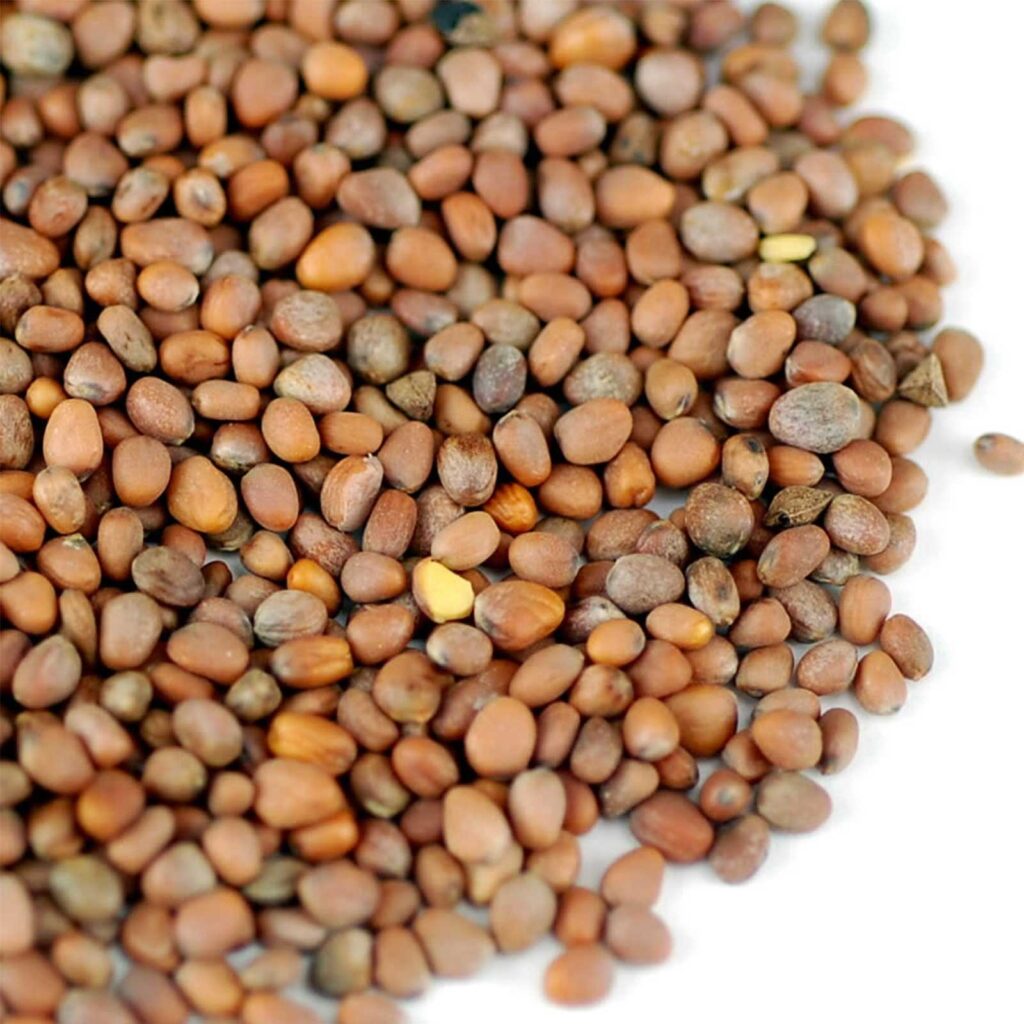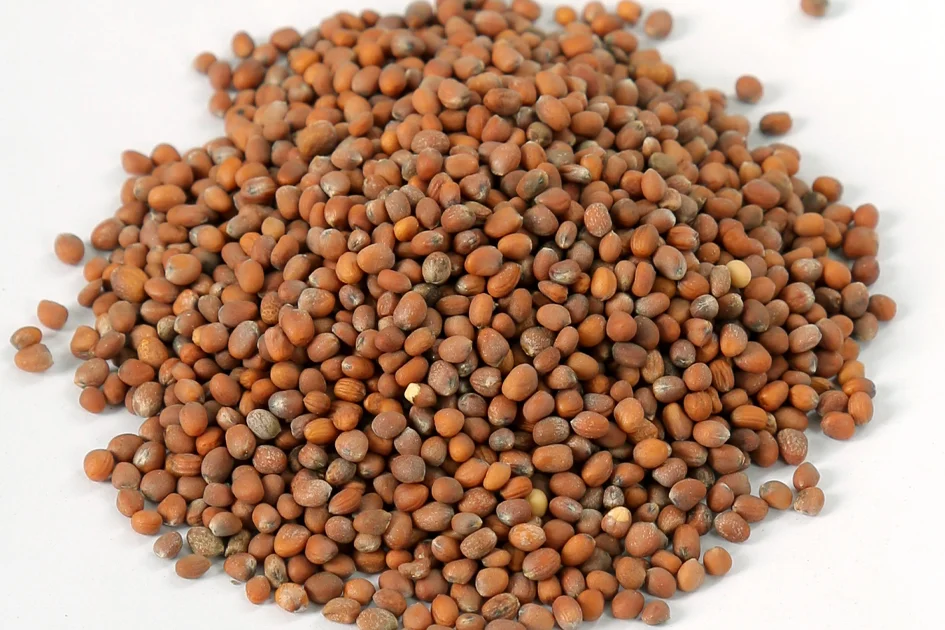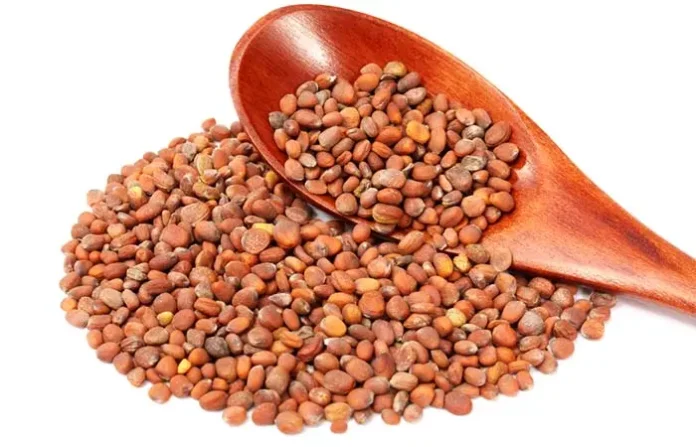INTRODUCTION:
Radish, commonly known as Mooli in India, is a fast-growing root vegetable widely cultivated for its crisp texture, peppery flavor, and nutritional value. The seeds of radish (Raphanus sativus) are small, round, and brown, and they germinate quickly—usually within 4 to 7 days—making them ideal for home gardens and commercial farming alike. Radish grows best in cool climates and well-drained, loose soil, thriving in temperatures between 10°C to 25°C.

English: Radish Seeds
Hindi: Mooli ke Beej (मूली के बीज)
Punjabi: Muli de Beej (ਮੁਲੀ ਦੇ ਬੀਜ)
Gujarati: Muli na Bee (મૂળી ના બીજ)
Marathi: Mula che Biyaane (मूळा चे बियाणे)
Bengali: Mula Bīj (মূলা বীজ)
Tamil: Mullangi Vidhai (முள்ளங்கி விதை)
Telugu: Mullangi Vittanalu (ముల్లంగి విత్తనాలు)
Kannada: Moolangi Beeja (ಮೂಲಂಗಿ ಬೀಜ)
Malayalam: Mullangi Vithukal (മുള്ളങ്ങി വിത്തുകൾ)
Urdu: Mooli ke Beej (مولی کے بیج)
Arabic: Bذور الفجل (Buzoor al-Fijl)
HEALTH BENEFITS:

Digestive health:
Radish seeds can stimulate digestion and may help with conditions like constipation.
Cough and sore throat relief:
They have expectorant properties that help with coughs and antitussive properties that can soothe a sore throat.
Diuretic properties:
They can help increase urine production, which supports the kidneys and helps flush toxins from the body.
Nutrient-rich:
Radish seeds are a good source of fatty acids, vitamins (especially vitamin C and folate), and minerals like manganese and potassium.
Potential for hair and scalp health:
Radish seed oil is used to moisturize the scalp, strengthen hair, and reduce dandruff and inflammation.
Nourishes skin:
Radish seed extract or oil is rich in vitamins, minerals, and antioxidants that can improve skin tone, texture, and hydration.
Moisturizes skin:
Applying radish seed oil can help address issues like dry skin, rashes, and cracking.
Promotes hair growth:
Some skin and hair care products utilize radish seed extract to promote hair growth and strengthen strands.
Antioxidant properties:
Radish seeds are rich in antioxidants, which fight free radicals in the body and protect cells from damage, potentially lowering the risk of chronic diseases.
Fights fungal infections:
The seeds contain the antifungal protein RsAFP2, which has been shown to combat fungal overgrowth.
Supports kidney health:
As a natural diuretic, radish seeds can help flush out toxins and support overall kidney function.
SIDE EFFECTS:

Gallstones:
Radishes can increase bile flow, which may worsen pain for those with gallstones.
Low blood sugar:
Large amounts of radish seeds may lower blood sugar levels, which can be a problem for people with diabetes or those on certain medications.
Thyroid function:
Radish seeds contain goitrogens, which can interfere with thyroid function, especially for those with existing thyroid conditions or iodine deficiency.
Blood pressure:
The radish seeds may lower blood pressure. Consuming a large amount could potentially lead to low blood pressure or hypotension.
HOW TO USE:
For Planting:
Sow radish seeds directly in the garden or pots.
Plant them about 0.5 to 1 inch deep in loose, well-drained soil.
Keep seeds spaced about 1 to 2 inches apart, with rows 6 to 8 inches apart.
Water regularly to keep the soil moist until seedlings emerge (usually 4–7 days).

For Cooking (Sprouts):
Soak radish seeds in water for 8–12 hours.
Drain and rinse seeds twice daily until they sprout (3–5 days).
Use the fresh sprouts in salads, sandwiches, or as a garnish for added crunch and nutrition.
For Medicinal Uses:
Radish seeds can be powdered and used in herbal remedies for digestion and detox.
Always consult a healthcare professional before using seeds for medicinal purposes.
For Oil Extraction:
Radish seeds can be pressed to extract radish seed oil, used in cooking or traditional medicine.
PRECAUTIONS:
Moderation is key: Most side effects are linked to overconsumption, so eating radishes in moderation is important.
Consult a doctor: It’s best to talk to a healthcare provider before adding large amounts of radish to your diet, especially if you have a pre-existing health condition.
Surgery: Avoid eating radishes before surgery, as they may lower blood sugar and interfere with blood sugar control.




